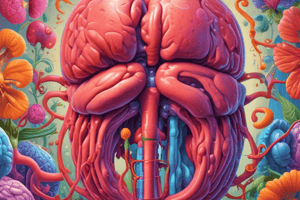Podcast
Questions and Answers
What is the underlying cause of hyperkalemia in hypokalemic (Type IV) RTA?
What is the underlying cause of hyperkalemia in hypokalemic (Type IV) RTA?
- Excessive potassium supplementation
- Impaired aldosterone production (correct)
- Increased proximal tubular reabsorption of bicarbonate
- Dehydration due to polyuria
What is the primary goal of treatment in RTA?
What is the primary goal of treatment in RTA?
- Correcting hypokalemia
- Correcting acidosis completely (correct)
- Reducing polyuria
- Restoring normal growth
What is the role of thiazide diuretics in the treatment of RTA?
What is the role of thiazide diuretics in the treatment of RTA?
- To treat hyperkalemia
- To reduce polyuria
- To correct hypokalemia
- To increase proximal tubular reabsorption of bicarbonate (correct)
What is the purpose of administering potassium as a salt in RTA treatment?
What is the purpose of administering potassium as a salt in RTA treatment?
What is used to treat hyperkalemia in RTA?
What is used to treat hyperkalemia in RTA?
What is the diagnostic tool used to assess electrolyte imbalance in RTA?
What is the diagnostic tool used to assess electrolyte imbalance in RTA?
What is the primary goal for children on maintenance dialysis?
What is the primary goal for children on maintenance dialysis?
What is the result of insufficient renal transport of bicarbonate or acids in the kidneys?
What is the result of insufficient renal transport of bicarbonate or acids in the kidneys?
Which part of the nephron tubule is responsible for the reabsorption of most bicarbonate?
Which part of the nephron tubule is responsible for the reabsorption of most bicarbonate?
What is the name of the syndrome that presents with failure to thrive and is associated with proximal RTA type 2?
What is the name of the syndrome that presents with failure to thrive and is associated with proximal RTA type 2?
What is the result of deficient hydrogen secretion into the filtrate in distal RTA?
What is the result of deficient hydrogen secretion into the filtrate in distal RTA?
What is the term for the reabsorption and secretion site in the kidneys?
What is the term for the reabsorption and secretion site in the kidneys?
What is the name of the type of RTA that results from combined proximal and distal defects?
What is the name of the type of RTA that results from combined proximal and distal defects?
What is a common symptom associated with proximal RTA type 2 and distal RTA type 1?
What is a common symptom associated with proximal RTA type 2 and distal RTA type 1?
What is the primary cause of renal osteodystrophy (ROD)?
What is the primary cause of renal osteodystrophy (ROD)?
What is a common cardiovascular complication of chronic kidney disease (CKD)?
What is a common cardiovascular complication of chronic kidney disease (CKD)?
What is the primary goal of dietary management in children with advanced CKD?
What is the primary goal of dietary management in children with advanced CKD?
What is the primary benefit of using ACE inhibitors or angiotensin receptor blockers in children with CKD?
What is the primary benefit of using ACE inhibitors or angiotensin receptor blockers in children with CKD?
What is the optimal treatment for end-stage renal disease (ESRD)?
What is the optimal treatment for end-stage renal disease (ESRD)?
What is the primary advantage of peritoneal dialysis compared to hemodialysis?
What is the primary advantage of peritoneal dialysis compared to hemodialysis?
What is the primary concern for children with stages 3 and 4 CKD?
What is the primary concern for children with stages 3 and 4 CKD?
What is the primary reason for avoiding potentially nephrotoxic medications in children with CKD?
What is the primary reason for avoiding potentially nephrotoxic medications in children with CKD?
What is the primary indicator of kidney damage in CKD?
What is the primary indicator of kidney damage in CKD?
At what stage of CKD do complications typically manifest?
At what stage of CKD do complications typically manifest?
What is the primary cause of anemia in CKD?
What is the primary cause of anemia in CKD?
What is the most common cause of CKD that presents between birth and 10 years of age?
What is the most common cause of CKD that presents between birth and 10 years of age?
What is the primary reason for growth failure in CKD?
What is the primary reason for growth failure in CKD?
At what stage of CKD is renal transplantation typically considered?
At what stage of CKD is renal transplantation typically considered?
What is the definition of chronic kidney disease?
What is the definition of chronic kidney disease?
Why may renal function deteriorate during puberty in CKD?
Why may renal function deteriorate during puberty in CKD?
Flashcards are hidden until you start studying




